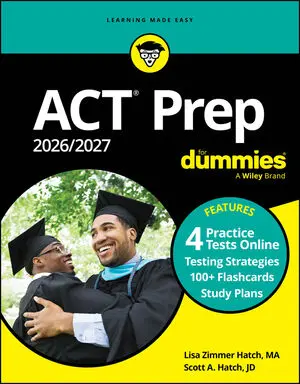Taking the ACT requires quite a bit of preparation. If you've taken the time to prepare, you don't want to jeopardize a good score by making a silly mistake. So be aware of the following catastrophes so that you can prevent them from happening to you:
Losing concentration: When you’re in the middle of an excruciatingly boring reading passage, the worst thing you can do is let your mind drift off to a more pleasant time. Although visualization (picturing yourself doing something relaxing or fun) is a good stress-reduction technique to practice before the exam, it stinks when it comes to helping your ACT score during the test. Even if you have to pinch yourself to keep from falling asleep or flaking out, stay focused.
Panicking over time: Every section on the ACT begins with directions and a line that tells you how many questions are in the section and, therefore, how many minutes you have per question. The ACT is no big mystery. You can waste a lot of time and drive yourself crazy if you keep flipping pages and counting how many more questions you have to do. You can do what you can do; that’s all. Looking ahead and panicking are counterproductive and waste time.
Messing up numbering on the answer grid: Suppose that you decide to postpone doing Question 11, hoping that inspiration will strike later. But now you accidentally put the answer to Question 12 in the blank for Question 11 . . . and mess up all the numbers from that point on. After you answer Question 40, you suddenly realize that you just filled in bubble number 39 and have one bubble left — aaargh! It’s easy to say, “Don’t panic,” but chances are your blood pressure will go sky-high, especially when you eyeball the clock and see that only one minute remains.
If you have a good eraser with you (and you should), the wrong answers on the answer grid should take only a few seconds to erase. But how on earth are you going to re-solve all those problems and reread and re-answer all the questions? You’re not, because you took the following advice: When you choose an answer, circle that answer in your test booklet first and then fill in the answer on the answer grid. Doing so takes you a mere nanosecond and helps you not only in this panic situation but also as you go back and double-check your work.
Rubbernecking: Rubbernecking is craning your neck around to see how everyone else is doing. Forget those bozos. You have too much to do on your own to waste precious seconds checking out anyone else. After you have the exam booklet in front of you, don’t look at anything but it and your watch until time is called.
Cheating: Cheating on the ACT is a loser’s game — it’s just plain stupid. Apart from the legal, moral, and ethical questions, let’s talk practicality: You can’t predict what types of grammatical mistakes will show up in the questions; what are you going to do, copy a textbook on the palm of your hand? All the math formulas that you need can’t fit onto the bottom of your shoe.
Worrying about previous sections: Think of the ACT as five separate lifetimes. You’re reborn four times, so you get four more chances to “do it right.” Every time the proctor says, “Your time is up. Please turn to the next test and begin,” you get a fresh start. The ACT rules are very strict: You can’t go back to a previous section and finish work there or change some of your answers. If you try to do so, the proctor will catch you, and you’ll be in a world of hurt.
Worrying about the hard problems: The ACT contains some incredibly hard problems and questions. Forget about them. Almost no one gets them right, anyway. A ridiculously few students receive 36s every year, and if you get into the 30s, you’re in a super-elite club of only a few percent of the thousands of students who take the ACT annually. Just accept the fact that you either won’t get to or can’t answer a few of the hard questions and learn to live with your imperfection. If you do go quickly enough to get to the hard questions, don’t waste too much time on them. See if you can use common sense to eliminate any answers. Then mark your best guess from the remaining choices. Keep reminding yourself that every question counts the same in a section.
Forgetting to double-check: If you finish a test early, go back and double-check the easy and medium questions. Don’t spend more time trying to do the hard questions. If a question was too hard for you five minutes ago, it’s probably still too hard for you. Your brain capacity likely hasn’t doubled in the last few minutes. If you made a careless or dumb mistake on an easy question, however, going back over the problem gives you a chance to catch and correct your error. You’re more likely to gain points by double-checking easy questions than by staring open-mouthed at the hard ones.






